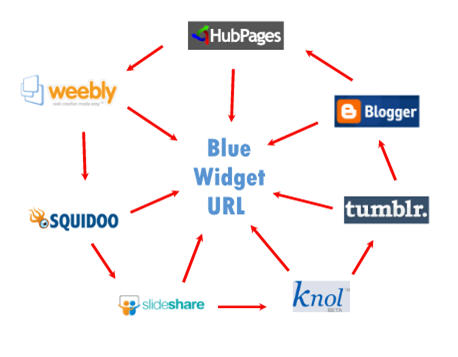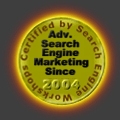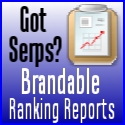 Look how old this is!
Look how old this is! I post at SearchCommander.com now, and this post was published 15 years 8 months 29 days ago. This industry changes FAST, so blindly following the advice here *may not* be a good idea! If you're at all unsure, feel free to hit me up on Twitter and ask.
AS OF MID 2011 THIS IS OUTDATED AND DANGEROUS – DO NOT DO IT!
Simply put, a Link Wheel is a group of pages on different hosts, that are about a specific product, subject or service, which all link to each other, and also link to a particular URL, or “money site”.
Some call them “link wheels”, some call them “authority hubs”, and some, I’m sure, use names I haven’t even heard of.
One of the first advanced search marketing books I read was called Revenge of the MiniNet, by Michael Campbell. In a nutshell, this is the strategy it talked about:
Using multiple domains, build multiple niche websites that are very tightly focused about a specific aspect of your business.
In turn each of those websites would link to each other, and each of those websites would link back to your core URL
You might build multiple websites, one for each model of Sunbeam Toasters, and each of those websites would link to each other, and each of those websites would link back to your primary Sunbeam product page, or toaster page, or main domain, etc.
In doing this, you create relevant content rich mini-sites, that link to other mini sites, and to a central hub, which gets authority from the links within those domains.
The Problem?
The problem with that, was that besides being an awful lot of work, it was relatively transparent, and your new domains had no authority at all, so it took a long time before you might see the benefit.
Also, people were regularly going to great pains to register the domains under different name, host the domains at different IP addresses with multiple hosting accounts, and basically spent a ton of money trying to hide the fact that they were building their own web of links.
A Better Strategy
Jumping ahead to today, many people are doing the same process using some of the Web 2.0 content sites that are out there, which automatically removes most of those transparency factors by having all of the sites hosted on quality domains with lots of trust.
With all the talk about the importance of domain authority and trust, you must know that some domains carry an awful lot of extra weight. I’ve seen this linking strategy be quite effective over the past year, and I know people that have been doing it a lot longer than we have.
For Example:
For example, let’s say the goal is to increase rankings for “blue widgets”, to this URL – http://yourdomain.com/bluewidgets.html
- Create an account at Blogger, Tumbler, Knol, Slideshare, squidoo, Weebly, and Hubpages, to name just a few.
- Go through the process of building a lens, a hub, a blog, a mini-site, or whatever each of those entities decides to call it.
- Ensure that the subject of each one is entirely devoted to specific things to know about blue widgets.
- From each of those, be sure to link to one of the others, and be sure to link to your primary URL
- Be sure to use the anchor text, “blue widgets” as well as other similar variations.
- Be certain that the URL you are linking to is optimized for that particular phrase, with “blue widgets” in the title, header tag, alt tags etc.

There’s probably tons of content you could create, all the way from the history of blue widgets, to specific features, benefits, and even potential future evolution of the product.
The point is to create whatever they offer, and to put up a good piece of original content that actually has some stand-alone value. Do *NOT* be overly commercial, or put up duplicate garbage, or you will likely get your creation declined.
Some people call this “parasite hosting” but that sounds somehow unethical. I don’t believe this is “black hat” or even an “inappropriate” strategy at all, as long as you are providing value to the end reader. After all, you’re going to get far more exposure at these web 2.0 properties, and educate far more people than you otherwise may, simply by posting on your own domain.
This strategy can be used to build multiple authority hubs to multiple areas of your site, and in 2009, it’s becoming more and more necessary to have these be tightly focused.
A true “widget baron” who is dominating the Internet will likely have multiple authority hubs for every color and style of widget, with their primary for that particular widget at the center of the wheel.
Outsource the process
*** December 20, 2009 – I’ve received reports of problems outsourcing to the company i was recommending, so i’ve removed them from here, and removed them from my SEO Toolbartoo, until they improve their quality.
I’ve actually run across a business that specializes creating these Link Wheels far more economically than we could ourselves, and I just ordered yet another one, when I decided to write this post.
- All the user accounts are created using United States IP addresses
- All of the web properties are created by hand, with no automated software.
- All content is written by authors with a good command of English.
- All of the usernames and passwords provided for your profile completion and future content additions.
It’s really a no-brainer, and I can’t speak highly enough about how happy we’ve been with the quality o f the stuff we’ve gotten from these guys…
Updated 11/10/2009 –
I’m revising my page, because after ordering a few of these, I realized that its’ NOT a “no brainer”, and if you don’t pay attention, and provide them with good details, the quality will suffer.
I (incorrectly) assumed it went without saying here that you DO need to intelligently choose your anchor text and backlinks.
You also want to ensure that you have decent profiles, because you want maintain these properties later, if you’re not doing so monthly. You need it to actually “look” real, because it IS real!
It’s not some magic bullet that you only do once. You have to add stuff, and build them into true mini authority sites, developing trust. Yes, you basically “fool” Google into thinking you’re a website that’s providing value by actually becoming one! 😉
Be sure whoever is building your link wheels is using a good name, good profile info, a good company description, a photo, a logo etc. and you’ll fare much better over the long haul.




















I read through , but how to make a transaction ? thanks
Just go to their pricing page, and you can order Link Wheels right there!
Scott,
This is actually a really great deal. You are right, you can’t do this for their price.
It appears from the content that I read that they use their blogs on wordpress etc? If so, it is actually a nice feature because each time they do a wheel the value of their blog increases. Thanks for the tip Scott.
Fantastic Article Scott, Your blog is now bookmarked. Please keep us posted!
I have a question, for example I make a comment in other blogs then I accidentally duplicate my comment could it be possibly consider as a spamming?
Yes, it would be considered spamming, in my opinion. Any time I get a comment that sounds dubious, I’ll Google a portion in quotes, and when I find it replicated – i delete it.
It is impossible for a person to create hundreds to thousands of websites and build links with them. Because of this reality, linkwheels are better for most web masters. Aside from being easy to make, they are economical and less time consuming to make.